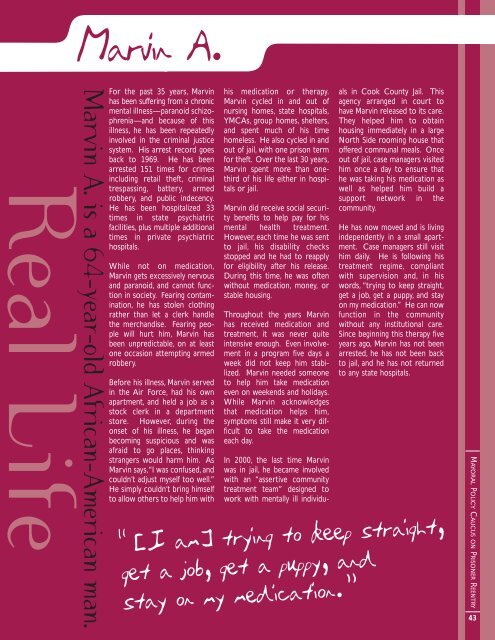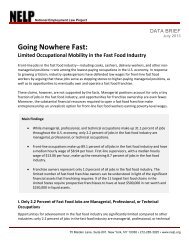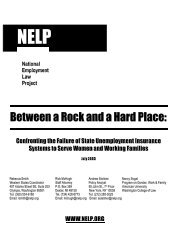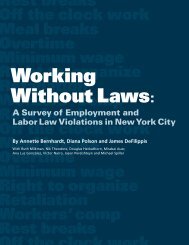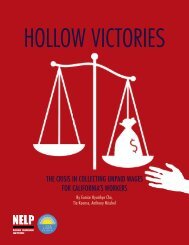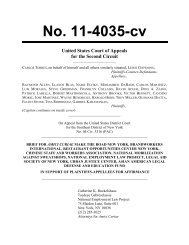Rebuilding Lives. Strengthening Communities.
Rebuilding Lives. Strengthening Communities.
Rebuilding Lives. Strengthening Communities.
Create successful ePaper yourself
Turn your PDF publications into a flip-book with our unique Google optimized e-Paper software.
Marvin A.<br />
Marvin A. is a 64-year-old African-American man.<br />
Real Life<br />
For the past 35 years, Marvin<br />
has been suffering from a chronic<br />
mental illness—paranoid schizophrenia—and<br />
because of this<br />
illness, he has been repeatedly<br />
involved in the criminal justice<br />
system. His arrest record goes<br />
back to 1969. He has been<br />
arrested 151 times for crimes<br />
including retail theft, criminal<br />
trespassing, battery, armed<br />
robbery, and public indecency.<br />
He has been hospitalized 33<br />
times in state psychiatric<br />
facilities, plus multiple additional<br />
times in private psychiatric<br />
hospitals.<br />
While not on medication,<br />
Marvin gets excessively nervous<br />
and paranoid, and cannot function<br />
in society. Fearing contamination,<br />
he has stolen clothing<br />
rather than let a clerk handle<br />
the merchandise. Fearing people<br />
will hurt him, Marvin has<br />
been unpredictable, on at least<br />
one occasion attempting armed<br />
robbery.<br />
Before his illness, Marvin served<br />
in the Air Force, had his own<br />
apartment, and held a job as a<br />
stock clerk in a department<br />
store. However, during the<br />
onset of his illness, he began<br />
becoming suspicious and was<br />
afraid to go places, thinking<br />
strangers would harm him. As<br />
Marvin says,“I was confused, and<br />
couldn’t adjust myself too well.”<br />
He simply couldn’t bring himself<br />
to allow others to help him with<br />
his medication or therapy.<br />
Marvin cycled in and out of<br />
nursing homes, state hospitals,<br />
YMCAs, group homes, shelters,<br />
and spent much of his time<br />
homeless. He also cycled in and<br />
out of jail, with one prison term<br />
for theft. Over the last 30 years,<br />
Marvin spent more than onethird<br />
of his life either in hospitals<br />
or jail.<br />
Marvin did receive social security<br />
benefits to help pay for his<br />
mental health treatment.<br />
However, each time he was sent<br />
to jail, his disability checks<br />
stopped and he had to reapply<br />
for eligibility after his release.<br />
During this time, he was often<br />
without medication, money, or<br />
stable housing.<br />
Throughout the years Marvin<br />
has received medication and<br />
treatment, it was never quite<br />
intensive enough. Even involvement<br />
in a program five days a<br />
week did not keep him stabilized.<br />
Marvin needed someone<br />
to help him take medication<br />
even on weekends and holidays.<br />
While Marvin acknowledges<br />
that medication helps him,<br />
symptoms still make it very difficult<br />
to take the medication<br />
each day.<br />
In 2000, the last time Marvin<br />
was in jail, he became involved<br />
with an “assertive community<br />
treatment team” designed to<br />
work with mentally ill individuals<br />
in Cook County Jail. This<br />
agency arranged in court to<br />
have Marvin released to its care.<br />
They helped him to obtain<br />
housing immediately in a large<br />
North Side rooming house that<br />
offered communal meals. Once<br />
out of jail, case managers visited<br />
him once a day to ensure that<br />
he was taking his medication as<br />
well as helped him build a<br />
support network in the<br />
community.<br />
He has now moved and is living<br />
independently in a small apartment.<br />
Case managers still visit<br />
him daily. He is following his<br />
treatment regime, compliant<br />
with supervision and, in his<br />
words, “trying to keep straight,<br />
get a job, get a puppy, and stay<br />
on my medication.” He can now<br />
function in the community<br />
without any institutional care.<br />
Since beginning this therapy five<br />
years ago, Marvin has not been<br />
arrested, he has not been back<br />
to jail, and he has not returned<br />
to any state hospitals.<br />
“[I am] trying to keep straight,<br />
get a job, get a puppy, and<br />
stay on my medication.”<br />
MAYORAL POLICY CAUCUS ON PRISONER REENTRY<br />
43


